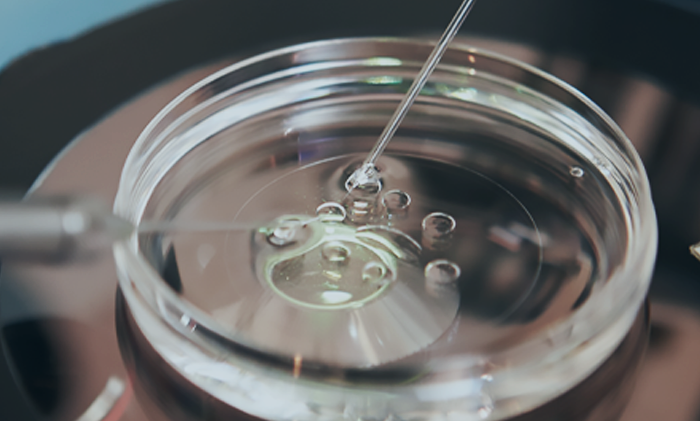


With centers in Abu Dhabi and Dubai and medical partners in Al Ain, Fakih IVF Fertility Center is available to help couples and individuals facing male or female infertility throughout the UAE and abroad. Fakih IVF Fertility Center has a high rate of success in all of our wide variety of assisted reproduction treatments including IVF-ICSI, Mini IVF, Natural Cycle IVF, IUI, Gender Selection, Comprehensive Chromosomal Screening (CCS), Screening for hereditary diseases through PGD, Male Infertility and much more.
Below is a description of the treatment options available at Fakih IVF Fertility Center and a short description of some of the more common Causes of Male Infertility If your cause of Male Infertility is not addressed below, do not hesitate to contact Fakih IVF Fertility Center to speak with a specialist and learn which treatment may benefit you.
Fakih IVF Fertility Center offers many treatment options for men facing Male Infertility. Fakih IVF Fertility Center’s Urology department is led by Dr. Rupin Shah. With over 24 years of experience, Dr. Shah is an internationally recognized expert in the field of Male Infertility with specialty in Sperm Mapping, Testicular Sperm Aspiration (TESA) and Micro-Dissection TESE procedures. If you are interested in assessing your fertility, book an appointment to schedule a Semen Analysis today.
Testicular Sperm Aspiration (TESA) is a minor procedure that typically takes 5-10 minutes under sedation. TESA is generally an option for men with Obstructive Azoospermia where it is expected that sperm will be found easily. During the procedure, sperm is directly removed from the testes to be used in an IVF-ICSI cycle.
Testicular Mapping is a minimally invasive procedure during which a fine needle is placed in different areas of the testes to obtain small samples of testicular fluid. The aspirate is fixed on a slide and checked for sperm following the procedure. If sperm is found, a future sperm retrieval will be scheduled during an IVF-ICSI Cycle and will be carried out from the sites where sperm was found during the original mapping.
Advanced Testicular Mapping is a technique during which a fine needle is placed in different areas of the testes, aspirating small samples of testicular fluid that is immediately analyzed for viable sperm. If viable sperm is found, it is frozen and used in a future IVF-ICSI cycle.
Micro-Dissection TESE (MicroTESE) is an invasive procedure utilized to locate sperm in men with Non-Obstructive Azoospermia or severe testicular failure. MicroTESE is especially helpful in these men as there may be very localized areas of sperm production that may be missed during blind biopsies or needle aspiration procedures. During a MicroTESE, the testes are surgically opened, tissue is inspected under a microscope and an intense search of every part of the testicle is performed to locate healthy areas that are more likely to contain sperm.
Simultaneous Staged Sperm Retrieval Procedure begins with Advanced Testicular Mapping, a technique during which a fine needle is placed in different areas of the testes, aspirating small samples of testicular tissue that is immediately analyzed for viable sperm. If adequate numbers of viable sperm are found, the procedure is terminated and the man is spared the open surgical Micro-Dissection TESE (MicroTESE). If no sperm is found in the aspirated samples, the surgeon immediately proceeds to perform a MicroTESE. Through Simultaneous Staged Sperm Retrieval, men get the highest chance of success with the least invasive method needed.
Varicocelectomy involves a small microsurgical procedure in which swollen veins are tied off while preserving the normal blood vessels. Performing a Varicocelectomy results in the greatest chance of repair for a varicocele and is the most common operation performed for Male Infertility.
Vasectomy Reversal is a microsurgical operation during which the tubes (vas deferens) that were cut during vasectomy are reconnected in order to allow natural conception. The success of the vasectomy reversal is typically dependent on the amount of time that has passed since the vasectomy.
To discuss the best treatment option for you, book an appointment with Fakih IVF Fertility Center today.Below is a short description of some of the more common causes of Male Infertility. If your cause of Male Infertility is not addressed below, do not hesitate to contact Fakih IVF Fertility Center to speak with a specialist and learn which treatment may benefit you. Obstructive Azoospermia occurs when sperm is being produced in the testes but cannot be found in the semen because of a blockage in the male reproductive tract. The good news is that sperm can be recovered in most causes through microsurgery. Non-Obstructive Azoospermia: Mature sperm are not found in the semen because of sperm production failure at various stages. Although sperm is not being found in the semen, there could be areas of the testes that are producing mature sperm. Retrograde Ejaculation: In some men, the bladder sphincter is damaged, allowing the sperm to flow back into the bladder and mix with urine. In most cases, sperm can be recovered from a urine sample and used during an IVF-ICSI cycle. Oligospermia (Low sperm count) is when semen has low concentration of sperm. Oftentimes, semen with decreased sperm concentration may also show significant abnormalities in sperm morphology and motility. Varicocele: Varicoceles may occur if a malfunction of the valves of the testicular vein causes blood to flow in a reverse direction and enlarges the veins within the scrotum.
Fakih IVF Fertility Center’s Urology department is led by Dr. Rupin Shah. With over 24 years of experience, Dr. Shah is an internationally recognized expert in the field of Male Infertility with specialty in Sperm Mapping, needle aspiration TESA and micro-dissection TESE procedures.

Modern technology and medical advancements continue to give couples facing infertility a greater chance of success in fulfilling their dreams of paren...
Read More
Egg and Sperm Freezing is an effective way for women and men to preserve their fertility. Individuals may want to consider Egg or Sperm Freezing if th...
Read More
Natural Cycle is an option for women who do not respond well to fertility medication or who have poor ovarian reserve. Such women do not produce more ...
Read More
Intrauterine Insemination (IUI), also known as Artificial Insemination, may be an option for couples if the wife’s fallopian tubes are patent (no ...
Read More
Fakih IVF Fertility Center has a full-service in-house Genetics Laboratory. — Genetics Laboratory in the UAE capable of performing Genetic Testin...
Read More
With today’s advanced reproductive technologies, identifying the gender of your embryos before pregnancy is possible through IVF and Comprehensive C...
Read More
In Vitro Fertilization (IVF) is the process of collecting eggs from the wife and sperm from the husband and fertilizing them in the Embryology Laborat...
Read More